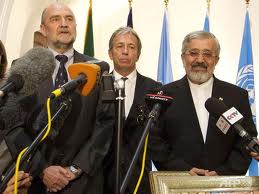Iran, IAEA talks different, but no result yet
Tehran's two-day negotiation with the International Atomic Energy Agency held at the office of the Iran envoy to IAEA, Ali Asghar Soltanieh at least has not failed, but what was achieved?
Soltanieh said that the nuclear talks were "constructive", while IAEA deputy director general and head of the Department of Safeguards, Herman Nackaerts, who had twice banned visits in January to the Iranian Parchin Military Base told reporters that "the two sides will meet again in Vienna on May 21 for more talks".
Expanding the talks time shows that Iran-IAEA didn't achieved any framework method to cooperate on some disputed issues including defining a means to allow Agency inspectors to visit an iron container at Parchin, which is alleged to be aiding Iran to make high explosive tests and related to nuclear weapon production.
This is quite a complicated issue, with regard to the fact that the six major powers and IAEA called on Iran to seriously consider allowing IAEA inspectors to visit this place urgently. On the other hand, Iran's months' long avoidance to agree with inspections is because Iran does not have any obligation to show military bases to the IAEA as part of the framework of the Non-Proliferation Treaty, so talking about defining a schedule about this issue seems to take more time.
However, Nackaerts's statements show Iran is likely to have taken positive steps during the talks and the existence of hope for the future may bring about results.
"The talks between Iran and IAEA will focus on the political, juridical and technical aspects, "Soltanieh told Trend on May 1.
Problems around Iran's nuclear ambitions have been made throughout the past decade, so it is high expectation that problems could be solved during two-day negotiations. However, the Monday talks will likely indicate the result of Iran and six major powers upcoming negotiations in Baghdad on May 23.
Positive talks would likely halt EU sanctions on Iranian oil which will come into force on July 1. Black gold which holds Iran's 80 per cent exports and the government's 50 per cent of revenues are Iran's so called Achilles heel.
If Iran and the six powers talks are to be effective and held in a positive atmosphere, then it will result in downing the international oil crude price, the issue that is very vital for world economic progress.


Comments
Post a Comment